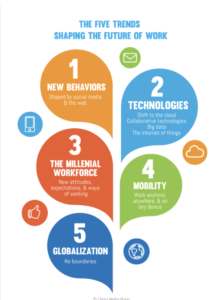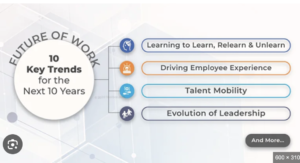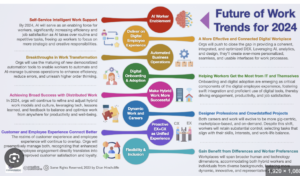Navigating the Workplace Evolution: Trends Shaping the Future of Work
The Future of Work: Trends Shaping the Workforce of Tomorrow

Introduction: The landscape of work is rapidly evolving, driven by technological advancements, demographic shifts, and changing societal norms. As we look to the future, it’s essential to understand the trends shaping the workforce of tomorrow. In this blog post, we’ll explore the latest developments and emerging trends in the world of work, offering insights into how businesses and employees can adapt and thrive in an ever-changing environment.

- Remote Work Revolution: The COVID-19 pandemic accelerated the adoption of remote work, ushering in a new era of flexibility and decentralization. As more companies embrace remote and hybrid work models, employees enjoy greater work-life balance, reduced commute times, and increased productivity. Organizations are investing in digital collaboration tools and reimagining traditional office spaces to accommodate remote teams.

- The Gig Economy Boom: The rise of the gig economy has transformed the way people work, offering flexibility, autonomy, and diverse income streams. Freelancers, independent contractors, and gig workers are in high demand across industries, providing specialized skills and expertise on a project basis. Platforms like Upwork, Fiverr, and TaskRabbit continue to gain popularity, connecting freelancers with businesses seeking short-term talent.

- Automation and AI Integration: Automation and artificial intelligence (AI) are reshaping job roles and workflows, automating repetitive tasks, and augmenting human capabilities. While some fear job displacement, others see automation as an opportunity to upskill and focus on higher-value work. Businesses are investing in AI-powered tools for data analysis, customer service, and decision-making, driving efficiency and innovation.

- Emphasis on Wellbeing and Mental Health: The pandemic underscored the importance of employee wellbeing and mental health in the workplace. Employers are prioritizing wellness initiatives, offering mental health resources, and promoting work-life balance to support their workforce. Flexible schedules, wellness programs, and remote work options are becoming standard offerings, fostering a culture of care and resilience.

- Diversity, Equity, and Inclusion (DEI) Initiatives: Organizations are increasingly recognizing the value of diversity, equity, and inclusion in driving innovation and fostering a positive work culture. Companies are implementing DEI initiatives, establishing diversity goals, and promoting inclusive hiring practices to build diverse teams and ensure equal opportunities for all employees.

- Hybrid Work Models: The pandemic revolutionized the way we work, giving rise to hybrid work models that blend remote and in-office collaboration. Companies are reimagining office spaces as flexible hubs for teamwork and innovation while empowering employees to work from anywhere. This shift towards hybrid work fosters greater autonomy, work-life balance, and productivity.

- Rise of Remote Work Tools: With remote work becoming the new norm, businesses are investing in a plethora of tools and technologies to support virtual collaboration and communication. From video conferencing platforms like Zoom and Microsoft Teams to project management tools like Asana and Trello, these digital solutions facilitate seamless remote work experiences and enhance team connectivity.
- Embracing Digital Transformation: Digital transformation has become a strategic imperative for businesses seeking to stay competitive in today’s digital economy. Companies are harnessing emerging technologies such as artificial intelligence, machine learning, and robotic process automation to streamline operations, optimize workflows, and drive innovation across all facets of the organization.

- Focus on Employee Wellbeing: As the lines between work and life blur, employers are placing greater emphasis on employee wellbeing and mental health. Flexible work schedules, wellness programs, and mental health resources are becoming standard offerings in the modern workplace, fostering a culture of care, resilience, and empathy.
- Agile and Adaptive Leadership: In an era of uncertainty and disruption, agile and adaptive leadership is essential for navigating change and driving organizational success. Leaders who embrace flexibility, empathy, and inclusivity can inspire their teams to adapt to new challenges, innovate solutions, and thrive in dynamic environments.

Conclusion: The future of work is dynamic, complex, and full of possibilities. By embracing emerging trends, fostering a culture of innovation, and prioritizing employee wellbeing, businesses can navigate the evolving landscape of work with confidence and resilience. As we embark on this journey together, let’s seize the opportunities that lie ahead and unlock the potential of the future workplace.
If you want to move House, Office, and also so many services feel free to visit